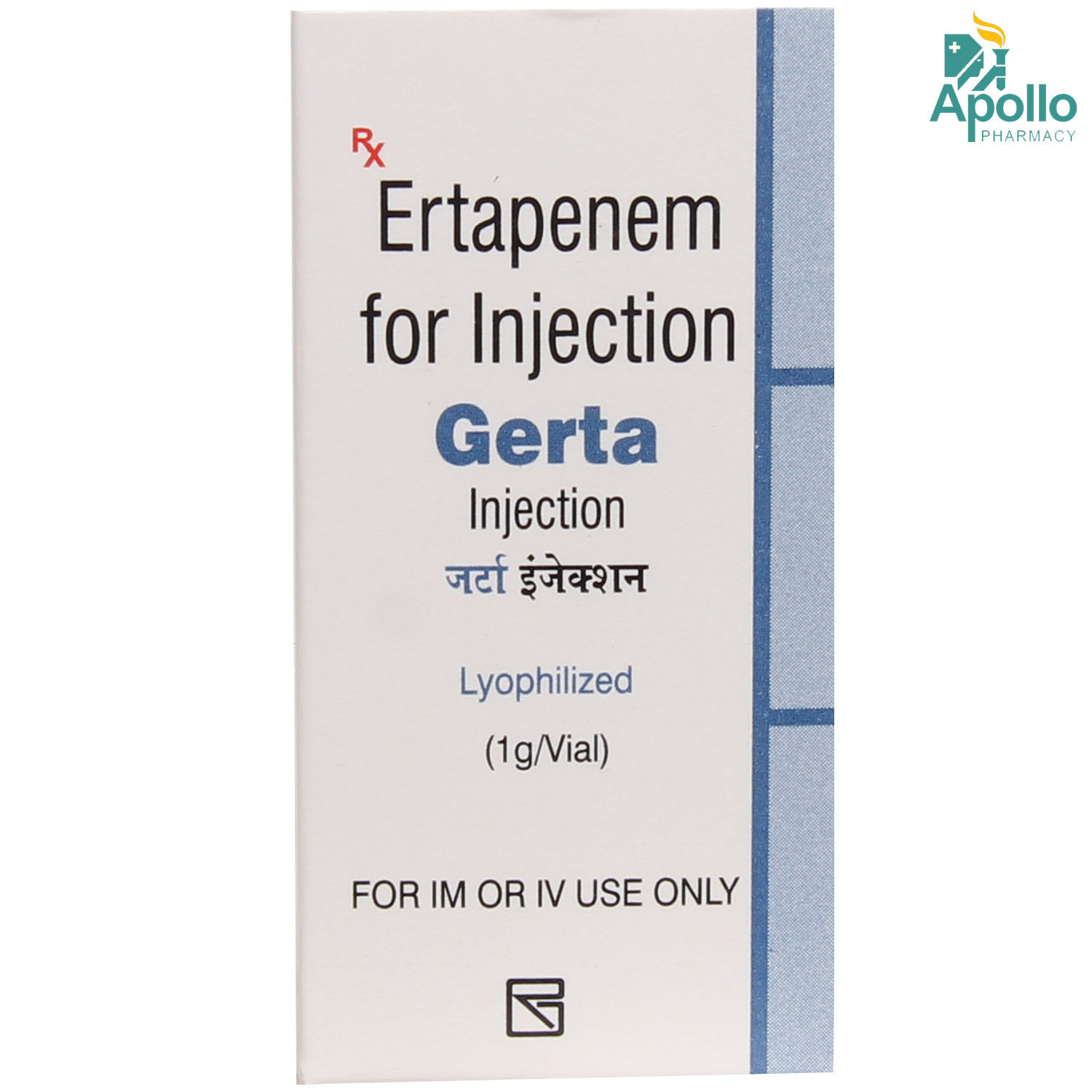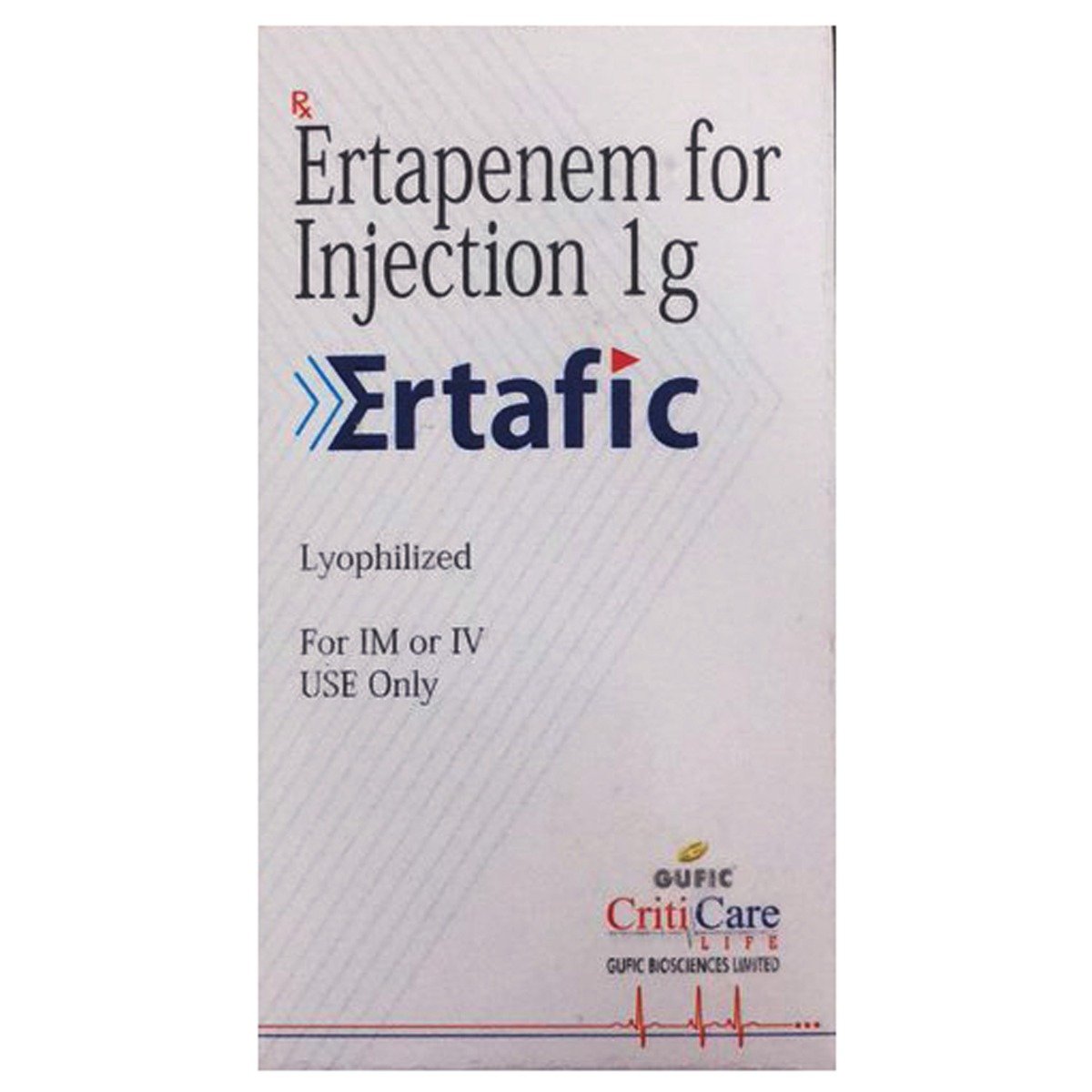- Home
- Ertamac 1gm Injection
Ertamac 1gm Injection Substitute
Ertamac 1gm Injection Substitute
Medicine Composition:
ERTAPENEM-1GMAll Substitutes & Brand Comparisons
RX
Out of StockERTAZEN INJECTION 1GM
₹769.3
(₹692.37 per unit)
67% CHEAPERRX
Out of StockErtaneon 1gm Injection
Neon Laboratories Ltd
₹2310
(₹2079.0 per unit)
3% CHEAPERRX
Out of StockErtalym 1gm Injection
Hetero Drugs Ltd
₹2400
(₹2160.0 per unit)
RX
Out of StockRatapenem 1gm Injection
Supermax Laboratories
₹2408
(₹2167.2 per unit)
RX
Out of StockErtacrit 1gm Injection
Cipla Ltd
₹2450
(₹2205.0 per unit)
2% COSTLIERRX
Out of StockEtranem 1gm Injection
AAA Pharma Trade Pvt Ltd
₹2899
(₹2377.18 per unit)
10% COSTLIERRX
Out of StockForstal 1 gm Injection 1's
Zyphar's Pharmaceuticals Pvt Ltd
₹3240
(₹2656.8 per unit)
23% COSTLIERRX
Invanz 1gm Injection 1's
Msd Pharmaceutical Pvt Ltd
₹3100
(₹2728.0 per unit)
26% COSTLIERRX
Out of StockErtacos 1gm Injection
Oscar Remedies Pvt Ltd
₹3600
(₹2952.0 per unit)
36% COSTLIERRX
Lyortam 1 gm Injection 1's
United Biotech Pvt Ltd
₹3614
(₹2963.5 per unit)
37% COSTLIERRX
Ezepnem 1Gm Inj
United Biotech Pvt Ltd
₹3614
(₹2963.5 per unit)
37% COSTLIERRX
Ertanem 1 gm Injection 1's
AAA Pharma Trade Pvt Ltd
₹3608
(₹3608.0 per unit)
67% COSTLIERRX
Gerta Injection 1's
German Remedies Ltd
₹4487.5
(₹3679.8 per unit)
70% COSTLIERRX
Ertafic 1 gm Injection
Gufic Bioscience Ltd
₹4808
(₹3942.6 per unit)
82% COSTLIERRX
Ertaxe 1 gm Injection 1's
Amr Healthcare
₹5500
(₹5500.0 per unit)
154% COSTLIER

When Should You Consider Switching from Ertamac 1gm Injection?
Patients may explore substitutes in the following scenarios:
- High monthly cost of Ertamac 1gm Injection
- Non-availability in local pharmacies
- Generic recommendation by a doctor
- Side effects or better tolerability with alternatives
What to Know Before Switching
Before you switch from Ertamac 1gm Injection to another medicine, here are some important points to keep in mind:
Same salt, different brands:
Most substitutes contain the same active ingredient - ERTAPENEM-1GM, but the fillers, coating, or manufacturing quality may vary slightly.
Consult your doctor first:
Even if the salt is the same, your doctor can confirm if the substitute is right for your condition, dosage, and health history.
Watch out for allergies or reactions:
Some people may react differently to certain brands due to inactive ingredients. If you notice any side effects, inform your doctor immediately.
Price ≠ effectiveness:
A lower-priced substitute doesn't mean it's less effective. Many generic medicines work just as well as branded ones.
Check the dosage form and strength:
Always match the substitute’s strength (e.g., 5mg, 10mg) and form (tablet, capsule, syrup) with what your doctor prescribed.
Uses
Ertamac 1gm Injection is used in the treatment of various bacterial infections. The detailed uses of Ertamac 1gm Injection are as follows:
- Intra-abdominal Infections: Ertamac 1gm Injection is used to treat infections within the abdominal cavity, such as peritonitis and abdominal abscesses.
- Skin and Soft Tissue Infections: Ertamac 1gm Injection is effective in managing bacterial infections of the skin and underlying tissues, such as diabetic foot infections without bone involvement.
- Community-Acquired Pneumonia: Ertamac 1gm Injection is prescribed to treat pneumonia (lung infections) acquired outside the hospital, particularly those caused by susceptible bacteria.
- Acute Gynaecological Infections: Ertamac 1gm Injection used in the treatment of pelvic inflammatory disease and postpartum endomyometritis (infection of the uterus lining following childbirth).
- Urinary Tract Infections (UTIs) : Ertamac 1gm Injection is used to treat complicated UTIs, such as pyelonephritis (kidney infection) caused by antibiotic-resistant bacteria.
- Surgical Prophylaxis: Ertamac 1gm Injection is also used to prevent surgical site infections in patients who have undergone surgery on the colon or rectum.
Medicinal Benefits
Ertamac 1gm Injection contains ‘Ertapenem’, which belongs to the class of ‘carbapenem antibiotics. It is used in the treatment of high-risk or serious bacterial infections. Ertapenem has bactericidal action and works by killing the bacteria causing the infection. It interferes with the formation of the cell wall, which is essential for the bacteria's survival. It has a broad spectrum of activity and is active against both gram-positive and gram-negative bacteria. It can act against various bacterial strains, such as Enterobacteriaceae (cause infections in healthcare settings), Streptococcus pneumonia (cause community-acquired pneumonia), and anaerobic bacteria, which are common causes of serious infections.
FAQs
The substitutes of Ertamac 1gm Injection contain the same active salt(s) - ERTAPENEM-1GM. However, they may differ in price, manufacturing quality, and inactive ingredients. Speak to your doctor to find a suitable option.
Switching to a generic substitute medicine in the place of Ertamac 1gm Injection is often possible if it has the same salt, strength, and dosage form. But always check with your doctor before making any changes to your medication.
Generics versions of Ertamac 1gm Injection are typically more affordable because they don’t include the original brand's research, development, and marketing costs. They contain the same active ingredient and are approved for safety and effectiveness.
Most people don’t notice any difference. However, some may react to different fillers or coatings. If you notice any unusual symptoms after switching, consult your doctor.
Make sure the new medicine has the same active salt, strength, dosage form. Always confirm the change with your doctor or pharmacist.
Substitutes of Ertamac 1gm Injection meet the same safety and efficacy standards as Ertamac 1gm Injection, but small differences in absorption or formulation can exist. A doctor can help you choose the right one for your needs.
Yes. Substitutes of Ertamac 1gm Injection may vary in color, size, or shape due to differences in manufacturing and branding, but this does not affect how they work.
Yes, it’s generally safe to switch between multiple substitutes of Ertamac 1gm Injection if they have the same salt and strength. However, always inform your doctor so they can monitor how your body responds.
Yes, many people safely use substitutes of Ertamac 1gm Injection for long-term treatment. Just ensure it’s done under medical supervision.
If your symptoms stay under control or lab results remain stable, the substitute for Ertamac 1gm Injection is likely working well. Regular follow-ups with your doctor are important.
Absolutely. Even with the same salt, small differences can affect how your body responds when switching from Ertamac 1gm Injection to its substitute. Always consult your doctor before switching.
Ertamac 1gm Injection is used to treat bacterial infections. It can be used to treat intra-abdominal (stomach) infections, skin infections such as diabetic foot infections, community-acquired pneumonia (lung infection), and acute (short-term) gynaecological infections such as urinary tract infections and pelvic infections. It is also used to prevent surgical site infections in patients who have undergone surgery on the colon or rectum.
Ertamac 1gm Injection contains ‘Ertapenem’, which belongs to the class of ‘carbapenem antibiotics. It has bactericidal action and kills the bacteria that are causing the infection. It works by destroying the cell wall (outer layer of the bacteria), which is essential for its survival.
Ertamac 1gm Injection may not cause anemia. However, it can lower platelet and white blood cell (WBC) count in some patients. Consult your doctor immediately.
Ertamac 1gm Injection may cause side effects such as nausea, vomiting, diarrhea, headache, and injection site pain. These side effects are usually mild and temporary. However, if any of these side effects persist or get severe, consult a doctor immediately.
Ertamac 1gm Injection is used only to treat community-acquired pneumonia. However, it is not used in patients with community-acquired pneumonia associated with osteomyelitis (a bone infection). So, you must inform your doctor about all the symptoms and illnesses you have before using Ertamac 1gm Injection.
intra-abdominal infection is a broader term used to describe infections associated with the stomach, intestine, peritoneum (lining of the abdominal wall), or other parts present in the abdomen. It mostly occurs due to a complication of another condition, such as appendicitis, following surgery, or a trauma. Common symptoms include nausea, vomiting, abdominal pain, and change in bowel habits.Â
If Ertamac 1gm Injection isn't suitable for you, don't hesitate to share any concerns or issues with Ertamac 1gm Injection, and your doctor will guide you through the next steps. They will explore alternative treatments. They may recommend a different antibiotic or adjust the dosage to minimize side effects. Your doctor will work closely with you to find a personalized solution for your unique needs and medical history.
Drug resistance occurs when bacteria or other microbes adapt and stop reacting to the medications intended to kill them. This makes infections more difficult to treat. Yes, it is possible to become resistant to Ertamac 1gm Injection. Bacteria can create enzymes called carbapenemases that break down Ertamac 1gm Injection, rendering it useless.
Ertamac 1gm Injection may cause a drop in blood sugar levels, although this is not very common. If you have diabetes and are prescribed Ertamac 1gm Injection to treat foot infections, regular blood sugar monitoring is crucial. Consult your doctor if you notice significant changes.
Ertamac 1gm Injection is not recommended for use in children below 2 years of age. Your doctor will decide the dose of Ertamac 1gm Injection based on your child's age and condition.
Do not stop taking your Ertamac 1gm Injection even if you are feeling better! It's important to have a complete recovery. Stopping too soon can cause incomplete recovery, recurrence of symptoms, and side effects. Instead, tell your doctor about your development and follow their instructions to ensure the best outcome for your health.





